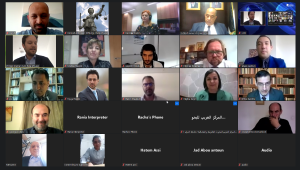At 3 pm, the online workshop was opened with a short welcoming speech by Lawyer Rabih Kays of LFPCP, in which he stated the fact that at the beginning of the pandemic many courts were closed without a plan or clear road-map for a re-opening or handling of the situation; however, soon after a variety of policies were implemented in different countries to face the challenges and uncertainties. This said, he added “in our webinar we look forward to seeing how courts adapted to such a new and unprecedented situation in our modern times”.
In his following opening speech, the Director of the Rule of Law Progamme Middle East & North Africa at the Konrad-Adenauer-Stiftung, Philipp Bremer, introduced the attendees to the Konrad-Adenauer-Stiftung, its program in Lebanon and the region. He expressed his thankfulness and joy that so many experienced judges from so many countries were willing to join and to share their experiences and expertise, because it is “a great chance to connect and learn from another: how did courts all around Europe and the MENA-Region deal with the situation, what are the best practices that have been developed?" Also, Mr. Bremer shared a message of hope, stating that even though we are currently seeing numbers go back up again, we, altogether, can beat COVID and use the situation to learn from it.
The workshop afterwards was divided into two parts: ‘the opening session’ and ‘the presentations’.
The Opening Session:
In this first part, four guests held further opening remarks. These were as following:
MP George Okais - Member of the Parliament Committee on Justice and Administration, opened by explaining that any urgent decision taken should be proportional to the threat confronted to, urging countries not to overreact while facing the covid-19 spread. In addition, he emphasized on the temporary nature of the decisions, stressing that “a temporary decision must never become a normal policy”.
In his following remarks, the Minister of Justice of Palestine - H.E. Dr. Mohammed al-Shalaldeh, highlighted the importance of state intervention in such an exceptional situation. He then gave some examples of the measures of prevention taken by the Palestinian government.
Following, the Head of the Judges Club in Morocco - Judge Abdul Latif Al Chentouf, pointed out that there is great work for everyone to do, noting that “an electronic transformation (digitalization) is on track in Morocco backed by a lot of emerging civic organizations”. He added: “from an academic and societal perspective the covid-19 was a disaster, but it was also an opportunity to enhance and encourage the use of electronic and digital tools”.
The last remarks in the first part of the webinar were those of Judge Faysal Makki. The Head of the Judges Club in Lebanon mentioned that justice has seven properties that should be applied, regardless the circumstances. In particular, he mentioned that: “one of those properties is sustainability; thus, we should rethink the traditional ongoing procedures inside the judiciary”.
The Presentations:
Judges from seven different countries, from different courts and councils, were asked to prepare position papers about the effects of the Covid-19 pandemic on the judiciary in their respective countries (four MENA region countries and three European countries). In this second part, the respective prepared research papers were presented:
1)- Judge Ahmed Abo El Enein - Egypt
2)- Judge Marisa Maurel Santasusana - Spain
3)- Judge Nejiba Zaier - Tunis
4)- Judge Kai Härmand - Estonia
5)- Judges Rabih Maalouf and Raja Abi Nader - Lebanon
6)- Judges Dragoş Călin, Nicolae Ploesteanu, Daniel-Mihail Şandru - Romania
7)- Judge Anass Sadoun - Morocco
The situation in the Arab countries - Morocco, Tunisia, Lebanon and Egypt - were similar: 90% of the courts were closed, and most procedural regulations were held off. This was similar in Spain, which had a three months’ hearings free. However, the differences between countries, also in Europe, could be seen with Estonia in particular, where a very flat administration level exists alongside a flexible and easy decision making system. This helped the judiciary as a whole to adapt swiftly to the changing situation. Estonia could thus be seen as a role model, being able to shift to e-procedures quickly, noting a 140% increase in video and remote hearings in only a matter of three years since 2018. In Romania and Spain, the State opted for optimistic plans; unfortunately these however took more time than expected to be implemented correctly.
Altogether, the pandemic ignited very general and at the same time very important questions as to how to maintain a stable, steady and sustainable access to justice.
In the days after the webinar, an e-paper summarizing and bringing together all the country studies and presentations will be created, translated, edited, issued and put online. You can find it on your right.
We would like to thank LFPCP for preparing this great event with us, and the many experienced judges and experts for joining us with their expertise and insight.







